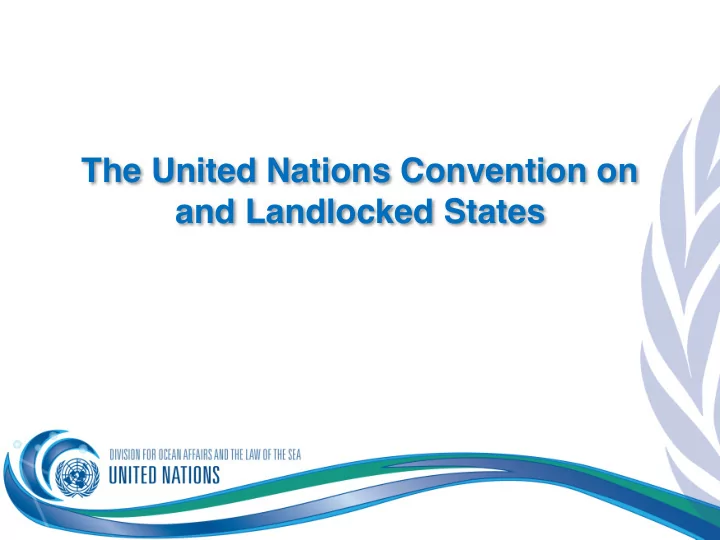

The United Nations Convention on and Landlocked States
General Assembly The General Assembly: • In its annual resolution on oceans and the law of the sea acknowledges, and draws attention to, the specific needs of LLDCs , in general and in the context of their aspiration for sustainable development and capacity-building ; • In resolution 73/124 of 31 December 2018, noted the adoption of the Vienna Programme of Action for Landlocked Developing Countries for the Decade 2014–2024 by the second United Nations Conference on Landlocked Developing Countries, held in Vienna from 3 to 5 November 2014, 132 following the comprehensive 10-year review of the implementation of the Almaty Programme of Action: Addressing the Special Needs of Landlocked Developing Countries within a New Global Framework for Transit.
United Nations Convention on the Law of the Sea (UNCLOS) • Constitution for the oceans • Comprehensive regime premised on the understanding that all the problems of the oceans are closely interrelated and need to be considered as a whole • Widely ratified: 168 parties • 20 land-locked developing States parties • 28 transit developing States parties • GA annual call for universal participation • DOALOS: Secretariat of UNCLOS
United Nations Convention on the Law of the Sea (UNCLOS) • SDG 14: Conserve and sustainably use the oceans, seas and marine resources • SYNERGY BETWEEN UNCLOS and SDG 14c: – General Assembly resolution 73/124: UNCLOS sets out the legal framework within which all activities in the oceans and seas must be carried out – SDG 14.c: Enhance the conservation and sustainable use of oceans and their resources by implementing international law as reflected in UNCLOS, which provides the legal framework for the conservation and sustainable use of oceans and their resources, as recalled in paragraph 158 of The Future We Want. • UNCLOS can benefit LLDCs in achieving SDG 14c
Right of access – Freedom of transit (Part X of UNCLOS) Landlocked States: • – Right of access to and from the sea – Freedom of transit through transit States: transit terms and modalities to be agreed upon – Ships shall enjoy treatment equal to that accorded to other foreign ships in maritime ports Transit States: • – prohibition to impose financial burdens on traffic in transit – obligation to avoid/eliminate delays or other technical difficulties to traffic in transit
Duties SDG 14.c Rights (Uses) SDG 14.c ➢ Duties of flag State (safety, ▪ Navigation security, labour, prevention of ▪ Fishing pollution) ▪ High seas ➢ SDG 14.1, 14.2, 14.3 ▪ EEZ (surplus) ➢ Conservation and management ▪ Laying of pipelines and cables of living marine resources ▪ Construction of artificial islands, ➢ SDG 14.4, 14.6 installations ➢ Protection and preservation of ▪ Exploration and exploitation of the marine environment, Area including prevention, ✓ Marine scientific research SDG reduction and control of 14.a pollution from all sources ✓ Transfer of marine technology SDG ➢ SDG 14.1, 14.2, 14.3, 14.a 14.5 ✓ Increase economic benefits SDG 14.7
Other benefits and duties • Benefits derived from activities in the Area • Benefits derived from payments and contributions made by coastal States arising from exploitation of non-living resources on the continental shelf beyond 200 M • Settlement of disputes • Participation in bodies established by UNCLOS - International Seabed Authority (ISA), including Council - International Tribunal for the Law of the Sea (ITLOS) - Arbitral tribunals, Conciliation Commission - Commission on the Limits on the Continental Shelf - Payment of assessed contributions to ISA and ITLOS
DOALOS and capacity-building Hamilton Shirley Amerasinghe Memorial Trust Funds Fellowship Programme ICP TF - CLCS TF UN-Nippon Foundation - ITLOS TF Fellowship Programme - - Regular Process TF and Fish Stocks TF - Alumni Network - BBNJ TF Technical Assistance and Training Programmes Contact DOALOS at doalos@un.org
Thank you for your attention
Recommend
More recommend